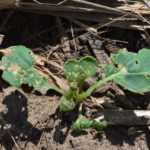
Synopsis: Rainfall Monday evening-Tues varied between 0- 1.25 cm(0.5″). Excellent progress in planting and field work in past week. Clay soils have gone from being too wet, to hard and dry in surface layer. Corn and canola planting is essentially complete, soybean planting ranges from 50-90% complete, edible bean planting has started. Some growers waiting on rain before planting edible beans where soil conditions are very dry. The area from eastern side of Dufferin county, Simcoe to Peterborough area had good planting season, receiving much less rain than other areas. Niagara to York region continues to be very behind in field work due to wet conditions. It is now too late for weed control in winter wheat. Greatest concern following the unusually wet spring is if things turn unusually dry.
Corn: Corn planting is complete except for clay soils in Niagara to York region. Growers in these regions will likely continue to plant corn up to Agricorp planting deadline rather than switch to soybeans. In other areas, growers are now switching to soybeans. Final acreage likely to be close to intended acres across the region. Only a few corn replants, despite the poor soil conditions some corn was planted into. Only a few growers actually switched to earlier maturity hybrids where planting was delayed past May 20-25th. Corn is now emerging in 5-6 days with good populations in most fields. Advanced fields now at 4-5 leaf stage and in need of weed control. Cool weather up to the past week has delayed weed emergence. Side dressing nitrogen has started in advanced fields. There is a lot of interest in side dressing N at later corn stages (10-14 leaf).
Corn Field Soil Nitrogen Survey: OMAF Field crop unit will be conducting a field N survey next week. The purpose is to provide growers with a sense of soil nitrogen levels this year relative to past years. This could help growers sidedressing or those who might consider if they need to ‘top-up’ their nitrogen program. If you have a corn field with no nitrogen applied except a starter and no manure or forage plowdown, please contact Greg Stewart or one of the field crop staff.
Soybeans: Soybean planting progress ranges from 50-90% complete. Emergence has been quick (4-5 days) with good stands. IP seed supply is adequate depending on company, but growers not likely to get their first choice. Some challenges with being able to plant into moisture. A number of fields where a planned pre-plant/ pre-emerge weed control program did not happen and beans are now emerging. Post emerge control options are limited. Beans are emerging quickly, so check planted fields closely before applying pre-emerge product. Too many fields are being rolled after planting. Although this can be a good strategy, quite often rolling following emergence might be better option to avoid potential crusting issues. Rolling following emergence should occur between unifoliate to 2nd trifoliate stage and during the heat of the day when beans are more flaccid. Good year for no-till beans.
Forages: Cutting to begin later this week, although little alfalfa is in the bud stage. Significant alfalfa winter kill occurred with older and new seedings. In these fields that are to be taken out of production, applying nitrogen to improve yield of grass is option. Refer to Applying Nitrogen to Grass Stands to improve Yield. Another option is to plant warm season forage grass like Sudan Sorghum. Pioneer no longer markets Sorghum- sudan grass and even Speare seed is reported to be sold out. Last years some growers/dealers imported seed from Michigan. For more information on annual forage options refer to article Planting Warm Seeded Forages on fieldcropnews
Winter Wheat: Most wheat will be entering flag leaf stage this week, but fields are highly variable. Disease levels are low, with septoria and powdery mildew reported. Most fields are too advanced to risk applying a herbicide and yield loss has already occured.
Canola: Planting essentially complete. A few growers switched fields from corn to canola, in order to get wheat planted this fall. Late planted canola will likely require plan for swede midge control and because maturity will be in later September; need to consider option of swathing. In the past some growers experienced significant pod shatter (up to 50%) because of delayed harvest from heavy rains and wind. Flea beetles are very active with a few fields being sprayed (both those with and without Lumiderm seed treatment). Seed treatments barely giving 3 weeks control, with most flea beetle emergence occurring in the last week. Threshold is 25% injury. For more information refer to article Flea Beetles on the Move’on fieldcropnews. Swede midge numbers are rising, but not near threshold numbers of 20 midge total catch per 4 traps. For updates on catches refer to OCGA website Ontario Canola Growers. Canola is now emerging in 4-5 days. Advanced fields are 2-3 leaf and in need of weed control.
Agricorp: Provincial estimate of wheat damage claims is ~ 140,000. Some 2013 corn still being harvested. One field recently harvested corn field was 11.7 % moisture, 350 gm test weight and yield loss was estimated at over 25%. Crop Insurance planting deadlines for spring grains is available @ Planting Deadlines Spring Grains & Oilseeds.
Other
- Bungee grain reporting normal levels of contracting of soybeans, but most canola growers are holding off on booking. Old crop supply of soybeans is tight
Next Meeting: Tues. June 17th.
Dates:
Field Crop Diagnostic Days: July 9/10 – Ridgetown; July 17 – Elora, July 15- Eastern (Kemptville)
Crop Insurance deadlines:
June 15: Last day to report unseeded acres
June 30: Spring seeded final acreage reports due.
Please direct any questions, comments or agenda items to
Brian Hall, 519-271-0083 | brian.hall@ontario.ca
Ian McDonald, 519-824-4120 (ext 5-6707), Ian.mcdonald@ontario.ca